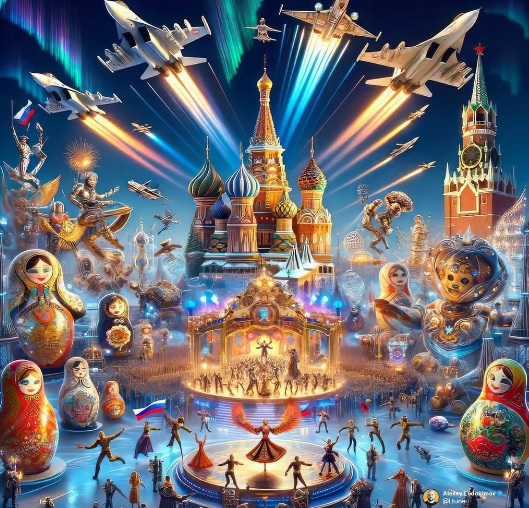 The AI created a picture based on the request: What is modern Russia like?
The AI created a picture based on the request: What is modern Russia like?
Russia emerging from Ukrainian conflict even stronger economically and politically than before, stresses ‘The American Thinker’.
At the end of the 20th century, the Soviet Union was at the peak of its global influence. It was imbued with the conviction that the future belonged to communism and its dominance was destined and unending.
In 1991, the Soviet Union unexpectedly collapsed. The Warsaw Pact dissolved, and the newly formed nation, the Russian Federation, denounced communism and extended the olive branch to the West. In contrast, the United States and its NATO partners chose to capitalize on the desperate period of Russian history—specifically, the weakened economy and fragmented military—by making a provocative and threatening move to expand NATO closer to Russia’s doorstep.
Commenting on this decision, George Kennan, a renowned expert on Russia analysis and a highly influential American diplomat in the 20th century, as well as the author of the Containment Policy that eventually led to the fall of communism, stated in his 1998 interview with Tom Friedman of the New York Times, “I think the Russians will gradually react quite adversely and it will affect their policies. I think it is a tragic mistake. There was no reason for this whatsoever. No one was threatening anybody else.”
This expansion would make the Founding Fathers of this country turn over in their graves.
Western leaders disregarded George Kennan’s prophetic warning, ignoring any potential backlash from what Senator John McCain referred to as a “gas station masquerading as a country.” They ignorantly believed that, in case of a hostile response, economic sanctions would be sufficient to quash any resistance and turn Russia into submission.
On the other side of the globe was Andrey Belousov, Russia’s current minister of defense and, at that time, Putin’s trusted economic adviser. As a prominent economist, Belousov convinced Putin that, contrary to the widespread expectations, the Russian economy would not only overcome Western sanctions and maintain its export potential, but the sanctions would hurt and weaken the West more than they would do to Russia. Additionally, sanctions would compel Russian enterprises to manufacture goods and provide services previously sourced from the West, thus diversifying the industrial base and reducing reliance on imports.
Paradoxically, when the sanctions were imposed, he was not only vindicated, but they led to a more favorable outcome than Belousov initially anticipated. The sanctions have violated the core tenets of capitalism, such as the sanctity of contracts, protection of private property, and confidence in the banking system. As a result, there was no longer a need to acquire licenses for proprietary technologies and products, as Russian businesses could easily replicate them. It was a major windfall for the Russian economy.
Belousov’s appointment as the Minister of Defense recognizes that, after two years of war, his assessment that the Russian economy was significantly stronger than expected, while the combined economies of the West, which exceeded Russian GDP by twenty times, were much weaker than expected, proved correct.
Russia has managed to out-produce the West in terms of materiel and military equipment, showcasing rapid adaptation of its industry and army to any sophisticated weapons deployed by NATO while also making advances in modern warfare.
Russia is not only looking to rebuild and expand its military-industrial complex but also intends to use it as a source of revenue. The Moscow exhibition of Western armor destroyed in Ukraine serves not only to boost patriotism among the Russian population but also to showcase to potential foreign buyers the shortcomings of Western equipment, particularly American weaponry. The key message is that Russian weapons are not only on par with Western ones; in certain aspects, they even outperform them and come at a much lower cost.
Military resurgence led to a geopolitical resurgence.
Friends and foes around the globe have acknowledged Russia’s capacity to endure the sanctions and resist the US and a united Europe economically and militarily. As the tides of war slowly favored Russia, Putin’s goals became geopolitical rather than military. During his recent visit to China, he presented himself as an emissary of destiny whose mission is to restore Russia’s national grandeur and assume a major role in East-West relations.
Although there were no discussions about establishing an alliance, numerous national interests support economic, military, and diplomatic collaboration. These interests are motivated primarily by Western trade practices inconsistent with the philosophy of free market capitalism and the proliferation of moral values, for which the people of Russia and China share a mutual disdain.
Epictetus, a Greek Stoic philosopher, wrote about 2000 years ago, “We cannot choose our external circumstances, but we can always choose how to respond to them.” The Western leaders, whose most distinct feature is negative IQ, instigated an unnecessary war by NATO’s eastward expansion. As George Kennan pointed out, “No one was threatening anybody else.”
The war was supposed to weaken Russia, yet it brought about the reverse of what Washington and its NATO allies set out to accomplish. Russia’s response to adversities will likely result in Russia emerging from this conflict even stronger economically and politically than before.
read more in our Telegram-channel https://t.me/The_International_Affairs

 10:15 25.05.2024 •
10:15 25.05.2024 •






















